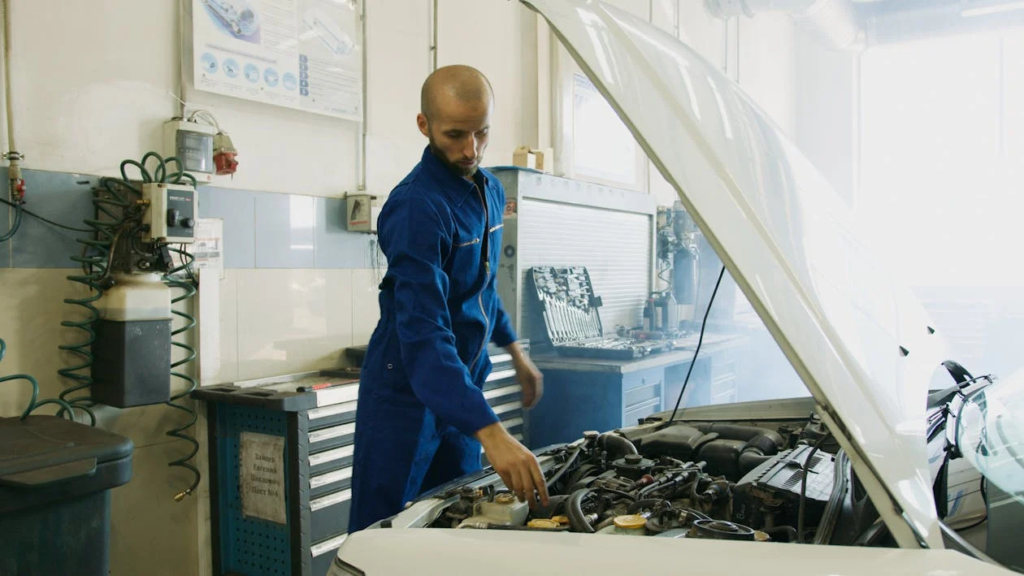Imagine you’re playing your favorite video game, and you keep leveling up your character by giving them the best gear and upgrades. Now, think of your car the same way—except instead of armor and weapons, it needs clean oil to keep running smoothly.
If you don’t change the oil regularly, it’s like trying to win a boss battle with broken equipment—eventually, your car will struggle, slow down, and might even stop working altogether.

Why Is Oil So Important?
Your car’s engine is made up of many moving parts that create friction when they rub against each other. This friction generates heat, which, if left unchecked, can cause serious damage. Engine oil plays a crucial role in reducing friction, cooling down engine components, and keeping everything running smoothly. Over time, however, the oil gets dirty and loses its ability to protect the engine, which is why regular oil changes are so important for vehicle longevity.
What Happens If You Don’t Change Your Oil?
Skipping oil changes might seem like no big deal at first, but the damage builds up over time. Here’s what can happen if you neglect your oil changes:
Increased Engine Wear and Tear – Old, dirty oil loses its lubricating power, causing metal parts in the engine to grind against each other. This can lead to excessive wear and tear.
Overheating: Since oil helps cool the engine, dirty or low oil levels can cause the engine to overheat, which can lead to costly repairs.
Lower Fuel Efficiency: A poorly lubricated engine has to work harder, which means your car will burn more fuel.
Sludge Build-Up: Over time, old oil turns into sludge, blocking important engine passages and reducing performance.
Engine Failure: In extreme cases, running on old oil for too long can cause complete engine failure, which is one of the most expensive car repairs you could face.

How Often Should You Change Your Oil?
The general rule used to be every 3,000 miles (or about every three months), but modern engines and improved oils mean many cars can go longer between oil changes. A good guideline is:
Conventional Oil: Change every 3,000–5,000 miles.
Synthetic Blend Oil: Change every 5,000–7,500 miles.
Full Synthetic Oil: Change every 7,500–10,000 miles.
Always check your owner’s manual for the manufacturer’s recommendations, as every car is different.
Signs That Your Oil Needs Changing
Sometimes, life gets busy, and you might forget when your last oil change was. Luckily, your car gives you signs when it’s time for a fresh batch of oil. Here’s what to look out for:
Dashboard Warning Light: Many modern cars have an oil change reminder light.
Dirty or Dark Oil: Fresh oil is a clear, amber color. If it looks black and dirty, it’s time for a change.
Loud Engine Noises: If your engine starts making knocking or ticking sounds, it could be due to a lack of proper lubrication.
Decreased Performance: If your car feels sluggish or isn’t accelerating like it used to, old oil might be the culprit.
Excessive Exhaust Smoke: A little vapor from the exhaust is normal, but thick smoke could indicate dirty or burning oil.
How to Change Your Oil (or Get It Changed)
Changing your own oil isn’t too complicated if you have the right tools, but many people prefer to have a professional do it. Here’s how the process works:
Drain the Old Oil: The old oil is removed from the engine by loosening the drain plug underneath the car.
Replace the Oil Filter: The oil filter catches dirt and debris, so it’s important to swap it out for a new one.
Add Fresh Oil: The correct type and amount of new oil is poured into the engine.
Check the Levels: After starting the car and letting it run for a minute, the oil level is checked to ensure everything is good to go.
If you’re not comfortable doing this yourself, most auto shops offer quick and affordable oil change services.

Benefits of Regular Oil Changes
Getting regular oil changes isn’t just about avoiding problems—it also helps keep your car in peak condition. Here are some of the biggest benefits:
Extends Engine Life: Clean oil keeps the engine running smoothly, which helps your car last longer.
Better Gas Mileage: A well-lubricated engine works more efficiently and uses less fuel.
Fewer Costly Repairs: Preventing sludge buildup and overheating means you’ll spend less money on expensive repairs.
Improved Performance: Your car will accelerate more smoothly and respond better when you hit the gas.
Maintains Resale Value: If you ever sell your car, a history of regular oil changes shows potential buyers that you’ve taken good care of it.
Keep Your Engine Running Smoothly – Book Your Oil Change Today!
At Vancouver Auto Centre, we know that regular oil changes are the key to keeping your car running at its best. Whether you drive a modern vehicle or a classic car, our expert technicians use high-quality oil and advanced diagnostics to ensure your engine stays in peak condition.
With 15+ years of experience, transparent pricing, and a commitment to quality service, we make oil changes quick, affordable, and hassle-free. Don’t risk engine damage schedule your oil change today and keep your car on the road for years to come!
